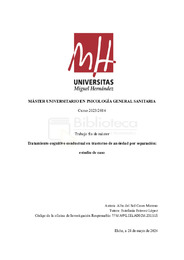Please use this identifier to cite or link to this item:
https://hdl.handle.net/11000/33984Full metadata record
| DC Field | Value | Language |
|---|---|---|
| dc.contributor.advisor | Estévez López, Estefanía | - |
| dc.contributor.author | Cases Moreno, Alba del Sol | - |
| dc.contributor.other | Departamentos de la UMH::Psicología de la Salud | es_ES |
| dc.date.accessioned | 2024-11-21T13:17:36Z | - |
| dc.date.available | 2024-11-21T13:17:36Z | - |
| dc.date.created | 2024-06 | - |
| dc.identifier.uri | https://hdl.handle.net/11000/33984 | - |
| dc.description.abstract | En este estudio se presenta el caso de un niño de 8 años que acude a consulta derivado por su pediatra, ya que refería síntomas físicos relacionados con la ausencia de su madre en determinadas situaciones. El objetivo terapéutico principal fue reducir lo máximo posible las conductas problema que el paciente presentaba con el fin de disminuir estos síntomas y dotarlo con las herramientas necesarias para afrontar las situaciones que los provocan y disminuir la probabilidad de que se repitan en el futuro. Para la evaluación se utilizaron las escalas CASI-N, SCAS y autorregistros. Para este caso, se aplicó tratamiento cognitivo conductual, se utilizaron técnicas como relajación, respiración y reestructuración cognitiva, el tratamiento tuvo una duración de 13 sesiones. Los resultados mostraron cómo se redujo significativamente la presencia de los síntomas y las conductas problema, lo que permitió al paciente ser más independiente y autónomo. | es_ES |
| dc.description.abstract | This study presents the case of an 8-year-old boy who was referred to a consultation by his pediatrician due to physical symptoms related to his mother's absence in certain situations. The main therapeutic objective was to reduce the problematic behaviors as much as possible to alleviate these symptoms and provide him with the necessary tools to cope with the triggering situations, thus reducing the likelihood of recurrence in the future. The assessment utilized the CASI-N, SCAS scales, and self-recordings. Cognitive-behavioral treatment was applied in this case, using techniques such as relaxation, breathing, and cognitive restructuring. The treatment lasted 13 sessions. The results showed a significant reduction in symptoms and problematic behaviors, which allowed the patient to become more independent and autonomous. | es_ES |
| dc.format | application/pdf | es_ES |
| dc.format.extent | 30 | es_ES |
| dc.language.iso | spa | es_ES |
| dc.publisher | Universidad Miguel Hérnández de Elche | es_ES |
| dc.rights | info:eu-repo/semantics/openAccess | es_ES |
| dc.rights | Attribution-NonCommercial-NoDerivatives 4.0 Internacional | * |
| dc.rights.uri | http://creativecommons.org/licenses/by-nc-nd/4.0/ | * |
| dc.subject | Ansiedad por separación | es_ES |
| dc.subject | cognitivo-conductual | es_ES |
| dc.subject | caso único | es_ES |
| dc.subject | trastornos de ansiedad | es_ES |
| dc.subject | infantil | es_ES |
| dc.subject.other | CDU::1 - Filosofía y psicología::159.9 - Psicología | es_ES |
| dc.title | Tratamiento cognitivo conductual en trastorno de ansiedad por separación: estudio de caso | es_ES |
| dc.type | info:eu-repo/semantics/masterThesis | es_ES |

View/Open:
DEL SOL TFM.pdf
1,64 MB
Adobe PDF
Share:
.png)
